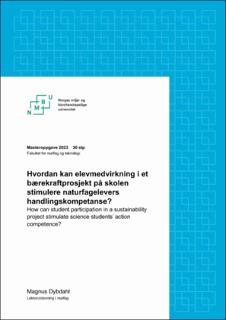| dc.contributor.advisor | Ane Eir Torsdottir | |
| dc.contributor.advisor | Astrid Tonette Sinnes | |
| dc.contributor.author | Dybdahl, Magnus | |
| dc.date.accessioned | 2023-07-19T16:27:19Z | |
| dc.date.available | 2023-07-19T16:27:19Z | |
| dc.date.issued | 2023 | |
| dc.identifier | no.nmbu:wiseflow:6839563:54592142 | |
| dc.identifier.uri | https://hdl.handle.net/11250/3080249 | |
| dc.description.abstract | Selv om enkeltpersoner kan ha kunnskap om løsninger på bærekraftutfordringer og hvilke handlinger som kan gjøres for å imøtekomme disse utfordringene, kan det allikevel være en avstand mellom kunnskap om bærekraftige handlinger og om disse handlingene blir gjennomført. Det har blitt foreslått at elevmedvirkning vil kunne tette denne avstanden. Denne studien ser på om å inspirere og motivere elevene til å gjøre bærekraftige handlinger gjennom medvirkning i et bærekraftprosjekt vil kunne stimulere elevenes handlingskompetanse. Handlingskompetanse blir her forstått som hvilke kunnskaper elevene har om bærekraftutfordringer og mulige løsninger, hvor stor tro de har på sin egen gjennomførings- og påvirkningsevne og hvor villige de er til å gjøre disse handlingene. Problemstillingen som blir forsøkt besvart er: Hvordan kan elevmedvirkning i et bærekraftprosjekt på skolen stimulere naturfagelevers handlingskompetanse?
For å svare på problemstillingen ble det gjennomført en enkeltcasestudie på en videregående skole på Østlandet. Skolen er kjent med utdanning for bærekraftig utvikling, og jobber mot en helskole-tilnærming til bærekraft. Det ble gjennomført en metodeblanding med en spørreundersøkelse og to fokusgruppeintervjuer. Dette utgjorde det empiriske grunnlaget som ble analysert.
Denne studien kan indikere at elevene er positive til å gjøre bærekraftige handlinger, så lenge handlingene ikke går merkbart utover faktorer som deres tid og økonomi. Elevene er allikevel positive til at slike prosjekter kan utgjøre en forskjell, og ønsker å ha flere prosjekter på skolen hvor de kan medvirke på og erfare bærekraftige handlinger. Elevene vil også at skolen tar mer ansvar i å vise frem hvordan bærekraft kan gjøres i praksis, og motivere elevene til å gjøre bærekraftige handlinger. Studien foreslår at det er individuelt hvilken rolle medvirkning i et bærekraftprosjekt kan bety for å stimulere elevenes handlingskompetanse. Resultatene indikerer allikevel at handlingskompetansen kan styrkes hvis medvirkningen føles relevant og inspirerer elevene til å gjøre bærekraftige handlinger. Elevene rapporterer at de er positive til å ha flere bærekraftprosjekter, noe som kan kunne stimulere handlingskompetansen til elevene ytterligere. | |
| dc.description.abstract | Even though individuals may have knowledge about solutions to sustainability issues and what actions can be done to accommodate these challenges, there may be a gap between knowledge about sustainable actions and if these actions will be taken. It has been proposed in previous studies that student participation could close this gap. This study examines if inspiring and motivating students to do sustainable actions through participation could stimulate the action competence of the students. Action competence is understood here as the knowledge students have of sustainability challenges and action possibilities, how much confidence the students have in their own ability to carry out the action and the impact it has, and lastly their willingness to act on these actions. The research question that will be tried to be answered is: How can student participation in a sustainability project stimulate science students’ action competence?
To answer the research question, a case study was conducted at an upper secondary school in Eastern Norway. The school is familiar with education for sustainable development and works towards and with the whole school approach to sustainability. A mixed method with a questionnaire and two focus group interviews was conducted. This formed the empirical basis that was analyzed.
This study can indicate that students are positive about taking sustainable actions, as long the actions do not noticeably exceed factors such as their time and finances. The students are nevertheless positive that such projects can make a difference and want to have more projects at school where they can participate in and experience sustainable actions. The students also want the school to take more responsibility in showing how sustainability can be done in practice, and to motivate the students to take sustainable actions. The study suggests that it is individual to what extent participation can play in stimulating students’ actions competence. The results indicates nevertheless that action competence can increase if the participation feels relevant and inspires students to take sustainable actions. Furthermore, the study can indicate that having several sustainability projects can in the long term further stimulate the action competence of the students. | |
| dc.language | nob | |
| dc.publisher | Norwegian University of Life Sciences | |
| dc.title | Hvordan kan elevmedvirkning i et bærekraftprosjekt på skolen stimulere naturfagelevers handlingskompetanse? | |
| dc.type | Master thesis | |
